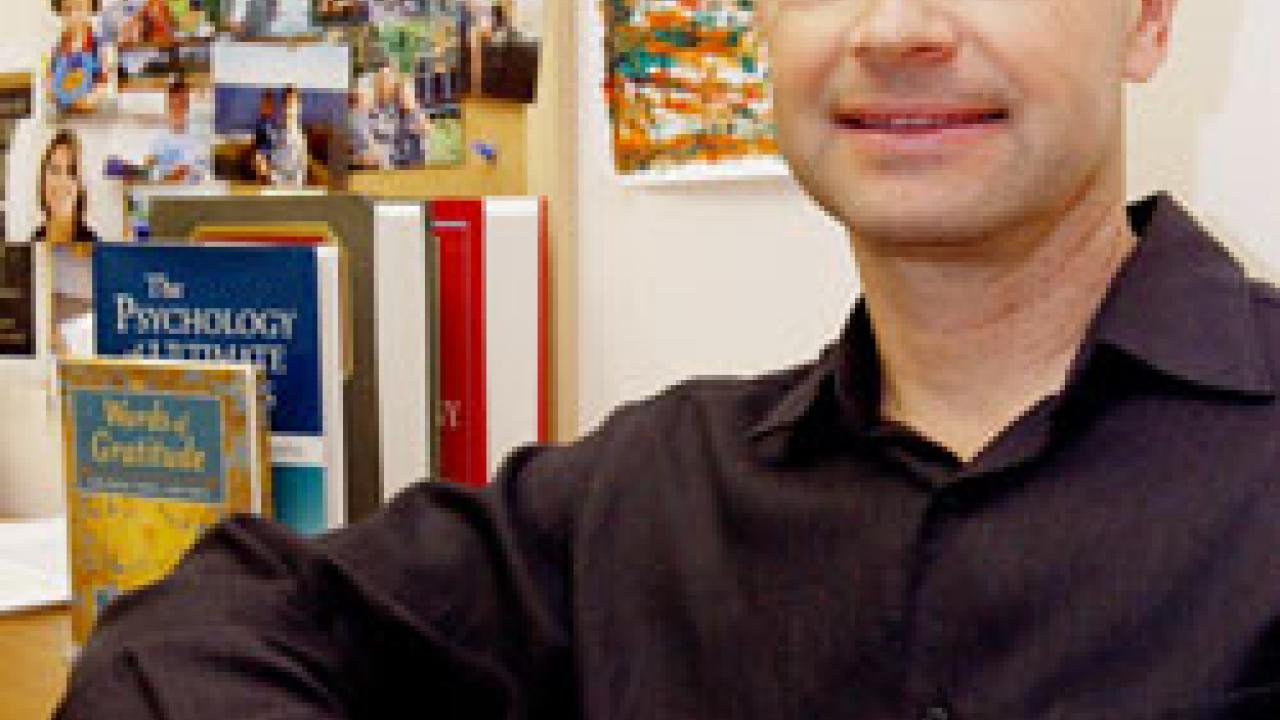Gratitude is the affirmation of life's goodness, says psychology professor Bob Emmons.
"The ability to live under an aura of pervasive thankfulness is a fundamental human strength," says Emmons, who is studying gratitude and developing methods to help people cultivate it. "Conversely, people who fail to feel grateful for the goodness in their lives cheat themselves out of their experience of life."
Emmons' gratitude research focuses on how people can weave together a fundamental orientation to life that lends significance and meaning to relationships, events, experiences, and ultimately, to life itself. In simple terms, it's an empirical test of counting one's blessings.
"There's also experience of appreciation and gratefulness that emerges from an encoun-ter with trauma or adversity," Emmons says.
He notes that people can avoid holiday or seasonal depression by focusing on not taking things for granted and not creating unrealistic expectations of friends and family. His co-edited book The Psychology of Gratitude, which will be published in January, says grateful people learn how to appreciate what they have now vs. what they want.
Like that old Rolling Stones' song that advises: "You can't always get what you want; but if you try sometimes, well, you might find you get what you need."
Emmons suggests keeping a "gratitude journal" to write down as a conscious practice for grateful living. When people do so, research shows, they feel closer to their higher power, sleep better, feel more connected to others, and make more progress toward goals. They also report fewer illnesses and higher levels of energy.
"Individual happiness is based on outlook and perception and realizing that the sources of this goodness lie at least partially outside the self," Emmons says.
The researcher once received a call from a 78-year-old man who had just finished reading Emmons' 2001 book, Words of Gratitude for Mind, Body and Soul.
"This man told me the book had changed his perspective and that he was going to now treat his children and grandchildren differently," Emmons says, noting: "That which we are grateful for we are more likely to protect and cherish."
Emmons is most grateful for his wife and two young sons, writing books, teaching at UC Davis and living in Davis for the past 15 years.
What's something surprising about you that people don't know?
Originally I wanted to be a meteorologist. There's a saying where I grew up in Connecticut -- "If you don't like the weather, wait a minute, and it'll change." As a child, I was fascinated with the power of nature, from watching storms come up the coast to measuring rainfall. It's the scientist in me.
Why did you choose a career in psychology?
In college, the science courses got harder. I barely passed physics; so at that point I realized meteorology would not be my future. Somewhat like weather, psychology is about predicting and understanding behavior -- that of people, though.
Why do you study gratitude?
It challenges me personally and professionally. There's a belief that academics study what they are bad at --- for me, it was to learn to be more grateful and to extend this to others. My mission is to get the word out to the academic community and the public.
Does emphasizing gratitude too much mean that one might not question bad situations?
It's critical to distinguish between the immediate and long-term effects of the bad event. Grateful people are more likely to derive some long-term benefit from an encounter with adversity, even though they may hate the fact that the situation happened as much as anyone. Instead of becoming bitter, they become better. They don't ignore or minimize the bad that has happened -- they transcend it.
What's the biggest issue today in religion psychology?
Instead of using reductionistic science to interpret why religion matters to people, we need to go beyond simplistic explanations to understand the pervasive nature of religious experiences. Anthropologists tell us that there's never been a society without religion.
What do you like most about your job?
Discovering that I helped a student in his career. A few years ago I bumped into a former student at O'Hare Airport in Chicago, and he thanked me for a course I taught on "health psychology." It inspired him to make a career in osteopathic medicine.
And the least?
The vast numbers of students walking around campus with cell phones attached to their ears. As a journal editor, having to reject articles, especially those by people I know. As a professor, having to turn away students from classes or from our graduate program. Just having to say "no" is tough.
Read any good books lately?
Keeping Faith, by Frank and John Schaeffer. Frank Schaeffer was a novelist living in Massachusetts's higher education circles. John, his youngest child, joined the U.S. Marine Corps straight out of high school. It's about father-son relationships.
What are some of your most treasured possessions?
The home videos of my two sons taken before they were 2 years old. They're irreplaceable -- you'll not see them at that wonderful age again. Also, I have a souvenir baseball bat from a 1969 New York Yankees game. My oldest son used it in T-ball recently -- and got a hit.
What's your guilty pleasure?
Jelly bellies, except for the popcorn and peppermint flavors. Spending too much money on books through Amazon.com. And baseball. I'm a New York Yankees fan. "Field of Dreams" was one of my favorite movies. •
